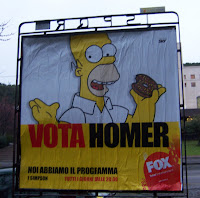

VIVA LISA!
Televisual Culture and Politics
archive
TThe Simpsonist Manifesto

animating the global awakening
THE BLOG
BACK
BY ARI CUSHNER
(unless otherwise noted)
Then I Met a Rebel in a Red Dress (Or, How I Became a Simpsonist)--Part One
Post date: July 8, 2008

BY way of introduction: I was born in November 1979, shortly after the start of the "Iran Hostage Crisis"; my conscious awareness of politics began during the election of George H.W. Bush in November 1988. Upon watching my mother's vociferous booing in response to television coverage of Bush's victory over Michal Dukakis, I felt inspired to repeat her gesture the following morning at my elementary school when the principal announced--just as we had finished reciting the "pledge of allegiance,"--that we should applaud for the new president-elect. I instead booed and was met by the cold shock of my fourth-grade teachers' hand clasped against my mouth so as to muzzle my displeasure. Although I was unaware then of the ideological dynamics underlying this incident, it has in retrospect become an indelible mark on my nascent political awareness. I learned at that moment that while the freedom to dissent against our leaders is sacred, the ability to do so when necessary must not be taken for granted.
In November 1992, as I observed my mother's relative enthusiasm in the wake of Bill Clinton's victory over Bush, I received my first (and to-date only) glimpse of how it feels to identify with a victorious presidential candidate. By then I had a vague understanding of why Ronald Reagan and George Bush were names that should not be uttered at the dinner table: in my family's political universe, Republicans were "bad guys" and Democrats were, at least by comparison, "good guys." Yet it was not until high school that I really began paying attention to political developments as such, from domestic elections to wars on foreign soil (although I do remember being proud of the fact that my older sister marched against the 1991 Gulf War telling our parents--veterans of the 1960s--"This is my Vietnam!"). When I entered UC Santa Cruz in 1998 I quickly immersed myself in a progressive culture similar to what I had experienced growing-up in urban San Francisco. As I became increasingly interested in all-things-political, the 2000 election between Al Gore and George W. Bush happened to be my first opportunity to vote for president.
By this time I was inclined to view both the Republican and Democratic Parties as beholden to the interests of wealthy corporate donors rather than the electorate, which was only 58% of all those eligible in 1996, 60% in 2000, and 64% in 2004. On my father's advice I had supported former senator Bill Bradley (D-New Jersey) as a progressive alternative to Gore, the "establishment" candidate in the Democratic primary. Hence during the general election I was, like many on the Left, faced with an unpleasant choice between following my ideals and supporting Ralph Nader or making a pragmatic decision to vote for Gore as the "lesser of two evils." Indeed, that election proved to be far more consequential than anyone had anticipated when the US Supreme Court intervened to halt the ballot re-count in Florida thus swaying the contest towards Bush, despite Gore's significant victory in the popular vote.
I watched election night coverage on cable along with the protracted dispute that ensued after the court, buoyed by a decidedly pro-GOP bias on FOX News and other networks, effectively installed Bush in the Oval Office. Witnessing an election so blatantly manipulated by political elites using mass media outlets to spread propaganda, I subsequently abandoned whatever had remained of my blind faith in "the system." Still, while less-than-enthusiastic about a potential Gore presidency, and upset at the way Nader and the Green Party had been marginalized in mainstream discourse, I feared along with many others that this "stolen election" portended a disastrous descent into governmental lawlessness at the hands of Bush, Cheney, and company. Sure enough, the Enron scandal--which had potential implications that were arguably worse than Watergate--exploded in the summer of 2001 yet was immediately and permanently pushed from the headlines by the deadly terrorist attacks in September of that year. And 9/11 was, of course, just the beginning...
(Stay tuned for part two)
Then I Met a Rebel in a Red Dress (Or, How I Became a Simpsonist)--Part Two
Post date: July 9, 2008

ENTERING college presented me the opportunity to revisit and reconsider The Simpsons, an animated TV sit-com I had been familiar with since its inception but never paid much attention to. I remembered clearly when Bart Simpson began his career as an irreverent pop-cultural icon who captured the nation's heart (while shocking conservative sensibilities) through catch-phrases like "Eat my shorts!" and "Don't have a cow, man!" In
 fact when The Simpsons began in 1989, I was the same age as ten year-old Bart who, like all the characters, does not officially grow older yet has matured appropriately behind-the-scenes and occasionally on-screen (just like the 2002 episode where his eight year-old sister Lisa goes to college when she would have been twenty-one in real life). Thus as I observed my dorm-mates and friends watch new episodes religiously every Sunday at 8:00 pm, and view multiple re-runs daily Mon-Fri, I realized that my generation had grown-up watching The Simpsons and thus in a sense had been raised along with Bart and Lisa (but not baby Maggie who hasn't uttered more than a few words in almost two decades). At the same time, my newfound obsession with politics inspired an increasing interest in the show each time I watched, as its witty satire and social commentary were seemingly unparalleled by anything I had seen on television since...perhaps ever.
fact when The Simpsons began in 1989, I was the same age as ten year-old Bart who, like all the characters, does not officially grow older yet has matured appropriately behind-the-scenes and occasionally on-screen (just like the 2002 episode where his eight year-old sister Lisa goes to college when she would have been twenty-one in real life). Thus as I observed my dorm-mates and friends watch new episodes religiously every Sunday at 8:00 pm, and view multiple re-runs daily Mon-Fri, I realized that my generation had grown-up watching The Simpsons and thus in a sense had been raised along with Bart and Lisa (but not baby Maggie who hasn't uttered more than a few words in almost two decades). At the same time, my newfound obsession with politics inspired an increasing interest in the show each time I watched, as its witty satire and social commentary were seemingly unparalleled by anything I had seen on television since...perhaps ever.
Homer Simpson, now possibly more iconic than Bart, has became a ubiquitous symbol of U.S. culture throughout much of the world, (at least Europe, Asia, and Latin America) attracting both those who interpret him ironically as well as people identifying with his regular-guy image and in-your-face attitude. Homer works as a safety inspector at the nuclear power plant yet spends most of h
 is waking hours at
is waking hours at Moe's Tavern drinking Duff beer with his buddies Barney, Lenny, and Carl. The plant is owned by Charles Montgomery "Monty" Burns, a nefarious plutocrat who wields self-serving power over all of Springfield USA, including Mayor Joseph Fitpatrick Fitzgerald Fitzhenry "Diamond Joe" Quimby--a composite parody of the Kennedy brothers and Bill Clinton portrayed as a liberal play-boy with a likable yet corruptible administration--and the buffoonish Police Chief Clancy (don't call me Piggum) Wiggum.
Moe's Tavern drinking Duff beer with his buddies Barney, Lenny, and Carl. The plant is owned by Charles Montgomery "Monty" Burns, a nefarious plutocrat who wields self-serving power over all of Springfield USA, including Mayor Joseph Fitpatrick Fitzgerald Fitzhenry "Diamond Joe" Quimby--a composite parody of the Kennedy brothers and Bill Clinton portrayed as a liberal play-boy with a likable yet corruptible administration--and the buffoonish Police Chief Clancy (don't call me Piggum) Wiggum.Known to townsfolk simply as (Mr.) Burns, the ancient and decrepit industrial magnate who controls the political-economy of Springfield has a penchant for devising evil schemes while twiddling his fingers together and throatily mumbling "excellent." An amalgamated parody of the classic "cartoon villain" and real-life political/corporate leaders, Burns is an alumnus of Yale (1914) and its notorious Skull & Bones secret society, which is often associated with the Bush family other members of the ruling elite. Accompanying Burns at all times is his faithful personal assistant Waylon Smithers Jr (both characters are voiced by Harry Shearer who brilliantly expounds "Burnsian" political satire weekly on his public radio program, Le Show). Smithers' homosexuality is known to virtually everyone except Burns, the object of his undying affection who appears conceptually incapable of understanding the nature of his assistant's attraction to him. In an episode from the seventh season (1996) when Homer temporarily fills-in after Burns forces Smithers to take "a long vacation," he informs his replacement: "Your new duties will include answering Mr. Burns' phone, preparing his tax return, moistening his eyeballs, assisting with his chewing and swallowin
 g, lying to Congress, and some light typing."
g, lying to Congress, and some light typing."The Monty Burns saga began in earnest at the start of season two in 1990, during The Simpsons' seventeenth episode (not including the forty-eight "shorts," or small segments that aired on the Tracy Ullman Show starting in April 1987). In "Two Cars in Every Garage and Three Eyes on Every Fish," Mr. Burns decides to run for state governor rather than pay the over $50 million worth of fines for violations discovered at the plant after an investigation instigated by publicity over Bart's capture of a mutant fish in waters near the Springfield Nuclear Reactor. The satire illustrates how a certain strata of the political elite move back-and-forth between the corporate sector and government, where they influence legislative and executive policies to their own advantage (think: Dick Cheney and Donald Rumsfeld, who according to James Mann are "part of the permanent hidden national-security apparatus of the United States").

This early episode initiated The Simpsons' ongoing commentary on the nature of U.S. electoral politics. Running a carefully stage-managed campaign against the liberal incumbent Governor Mary Bailey, Burns hires expensive public-relations consultants and attack-ad specialists who put him in a position to win based on the polls. Yet still worried that the old man does not seem "human enough" to voters, Burns' handlers schedule a televised election-eve dinner-table event at the family home of an "average Joe," who of course turns out to be Homer. In large part at the behest of Lisa, who shares her mother's enthusiastic support for Bailey, Marge purposefully sabotages the event by cooking and serving the three-eyed fish that Bart had taken as a pet and named Blinky. Unable to stomach the fish so obviously contaminated with radiation, despite having recently promised that it was perfectly safe to eat, Burns subsequently loses the election after having his hypocrisy exposed on television. Lisa emerged from this episode as an avowed liberal eager to oppose the conservative establishment led by Burns. The would-be governor, in turn, used his wealth and power to manipulate public opinion in a demonstration of how prohibitively expensive access to mass media has an undue influence in determining the outcome of elections.

This vein of commentary continued at the beginning of the third season (1991) in "Mr. Lisa Goes to Washington," which was essentially Lisa's formal unveiling as a progressive critic of the status-quo in American politics. This episode begins with her enthusiastic entrance into a "Patriots of Tomorrow" essay contest, through which she and the family win a trip to the US Capitol and a stay at the Watergate Hotel. Full of youthful idealism while touring the sites prior to delivering her essay as a finalist in the competition, Lisa witnesses an exchange of a cash bribe between a Congressman and the lobbyist for a logging company seeking a permit to "thin out the clutter" in Springfield National Forest." She subsequently abandons her essay praising the nation's rise to greatness through the "simple ideals of equality and justice," and instead decides that "the truth must be told!" The following day she takes the podium to expose and condemn the Congressman while excoriating Washington politicians generally for introducing "the fetid stench of corruption" into the air. She concludes: "Don't worry Congressman, I'm sure you can buy all the votes you need with your dirty money...and this shall be one nation, under the dollar, with liberty and justice for none!" A Senate page on the judge's panel reacts to Lisa's anguished oratory, titled "Cesspool on the Potomac," rushing to a phone and alerting his boss: "there's a problem at the essay contest... A little girl is losing faith in democracy!" The shocked Senator springs into action and promptly organizes an FBI sting that succeeds in closing the books on the dirty Congressman (think: Tom Delay, Randy "Duke" Cunningham, William Jefferson), followed by a swift vote in Congress--and a bill signed by the president--expelling him from office all in the course of three hours. While leaving the contest Lisa explains to her parents that she "couldn't think of a nice way to say 'America stinks.''' Just then a newsboy hands Homer a copy of the Washington Beacon bearing the headline "EXTRA! Congress Cleans House." As Marge reads aloud the sub-headline: "Imprisoned Congressman Becomes Born-Again Christian," Lisa drolly exclaims: "I can't believe it, the system works!" Yet one can in fact draw the opposite message from the sarcastic conclusion of this episode, which actually establishes the basis for Lisa's burgeoning disillusionment with "the system" upon witnessing the rank hypocrisy that lurks behind the rhetorical facade
 of
American democracy. She began to realize that her government, like all
authority, is not inherently trustworthy, and that there is something
fundamentally odious about the nature of politics. Congress will always be "cleaning house," but the cesspool of corruption in Washington will continue
to fester so long as its root causes remain un-addressed while
deceitful leaders "find god" and are exonerated from their crimes.
of
American democracy. She began to realize that her government, like all
authority, is not inherently trustworthy, and that there is something
fundamentally odious about the nature of politics. Congress will always be "cleaning house," but the cesspool of corruption in Washington will continue
to fester so long as its root causes remain un-addressed while
deceitful leaders "find god" and are exonerated from their crimes.The question that Lisa began to ask herself--and that I too pondered as I realized the extent of systemic corruption--is the same question that has plagued the Left ever since it was posed by Lenin at the turn of the twentieth century: what is to be done? I seriously considered this problem as I grew increasingly interested in The Simpsons and intrigued by the political possibilities of this brilliant and extraordinarily popular television satire. Having missed the first ten or so seasons, I and a college roommate began watching and recording daily re-runs as well as taping and cataloging each new episode. Throughout the course of several months we produced an immense collection of episodes that we then began to rearrange and collate into a VHS "Simpsons library" organized in order by season and episode (this was before FOX began releasing complete-season DVDs). I subsequently joined ranks with not only a vast legion of "Simpsons fanatics," but also a relatively smaller (yet surprisingly large) group of intellectuals generally disinclined to watch television but obsessed with the subversive antics of "America's Favorite Family." My undergraduate adviser in the American Studies department shared my views onThe Simpsons in these regards, which included a fascination with the fact that the funniest and most ingenious satire on television was simultaneously a multi-billion dollar marketing/revenue machine for Rupert Murdoch's News Corporation. My adviser fostered my academic interest in the show, and encouraged me to research The Simpsons' production and the role of creator Matt Groening as well as influential writers such as George Meyer and Conan O'Brien, who had been affiliated with The Harvard Lampoon. Through this process I concluded that The Simpsons was indeed a progressive satirical institution that the Left and its allies should embrace whole-heartedly in spite of its position on FOX. This concept formed the basis of my senior thesis, "The Simpsonist Manifesto: How a Popular Culture Phenomenon May Revolutionize the Course of Human Understanding, Relations, and Action in Mainstream Society." I submitted this (admittedly polemical and in retrospect somewhat raw ) essay at the end of my junior year, in the spring of 2001, thus leaving the following spring open to design and lead a student-directed seminar on "The Simpsons and Political Culture." Thus began my journey towards becoming a Simpsonist.
But where did it go from here? How did the events of 9/11 (re)shape my thinking? What exactly is Simpsonism, anyway? Stay tuned...
(The third and final segment of this introductory post is on the way).
Text
may be reproduced for educational or non-profit purposes only, if properly
referenced to the author and linked to this site. Please request permission before
reposting more than five hundred words or otherwise publishing any
written material. It is presumed that all non-photographic images
posted herein are available to the public under fair-use law.
Contact: simpsonist@gmail.com
JUST THE OTHER SIDE OF NOWHERE PRODUCTIONS
© Copyright 2008 by Ari Cushner
Contact: simpsonist@gmail.com
JUST THE OTHER SIDE OF NOWHERE PRODUCTIONS
© Copyright 2008 by Ari Cushner